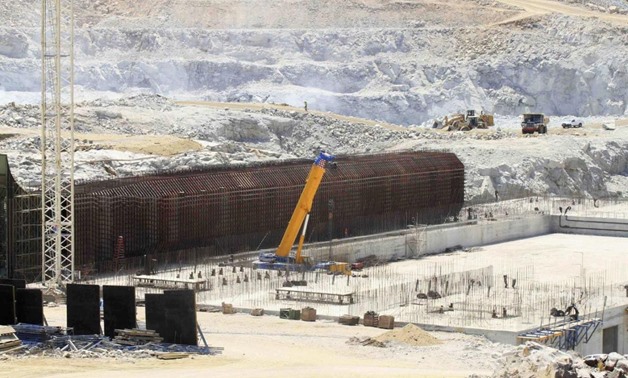
A general view shows construction activity on the Grand Renaissance dam in Guba Woreda, Benishangul Gumuz region in this March 16, 2014 file photo.
CAIRO – 6 November 2020: The European Union (EU) will play a positive role in the controversial issues of the Grand Ethiopian Renaissance Dam (GERD) between Egypt, Sudan and Ethiopia, said European Council President Charles Michel in an interview with al-Hadath channel on Friday.
He said that the EU is aware of the importance of this file for the three countries, noting that he discussed this matter with Egypt several times.
Michel added that the EU also is following up on the latest development in Ethiopia, clarifying that the council has close contact with the Ethiopian authorities.
The European Council President’s comments came a day after his meeting with Egyptian President Abdel Fattah El Sisi on Thursday. During the meeting, resident Sisi proposed establishing an international forum that gathers people from Islamic and European communities to fight extremism.
As they met in Cairo, they agreed on the need to establish this forum to face the hate speech, consolidate the foundations of tolerance, peaceful co-existence and spread mutual respect and the dialogue language.
Michel’s visit to Egypt came a day after the Egyptian, Sudanese and Ethiopian sides have not reached an agreement on a methodology for completing negotiations on the controversial dam.
The conflict between Egypt, Sudan, and Ethiopia dates back to May 2011 when Ethiopia started building the dam; Egypt voiced concern over its water share [55.5 billion cubic meters].
Three years later, a series of tripartite talks between the two countries along with Sudan began to reach an agreement, while Ethiopia continued the dam construction.
In 2015, the three countries signed the Declaration of Principles, per which the downstream countries should not be negatively affected by the construction of the dam.
In October 2019, Egypt blamed Addis Ababa for hindering a final agreement concerning a technical problem, calling for activating Article No. 10 of the Declaration of Principles, which stipulates that if the three countries could not find a solution to these disputes, they have to ask for mediation.
Washington had brokered a tripartite discussion between the three countries, in presence of the President of the World Bank (WB) starting from November 6, 2019 until February 27 and 28, 2020 when Ethiopia apologized for being absent from the negotiations.
During these rounds of talks, tangible outcomes were agreed on among the three parties concerning the rules and mechanism of operating the dam and the filling process of the reservoir during the drought and prolonged drought; however, the Ethiopian and Sudanese refused to sign the US/WB-drafted deal.
In a meeting with reporters in Cairo on the sidelines of Cairo Water Week last month, Head of the EU mission to Egypt, Christian Berger said the EU is supporting the negotiation process on the dam.
“We support that role and we support the negotiations that are ongoing [...] There are talks going on and we as the European Union will continue our services,” he said.
Answering a question by Egypt Today on the possible reaction of the European Union in case the three countries fail to reach a comprehensive agreement, he said, “We want the political process and this negotiation process to succeed. So that's where we are. We are putting our weight behind us. We're supporting the chair that is running these negotiations [In an indication to the African Union]. I think that's where we are at the moment. I would not speculate about any measures that may come down the road.”

Comments
Leave a Comment